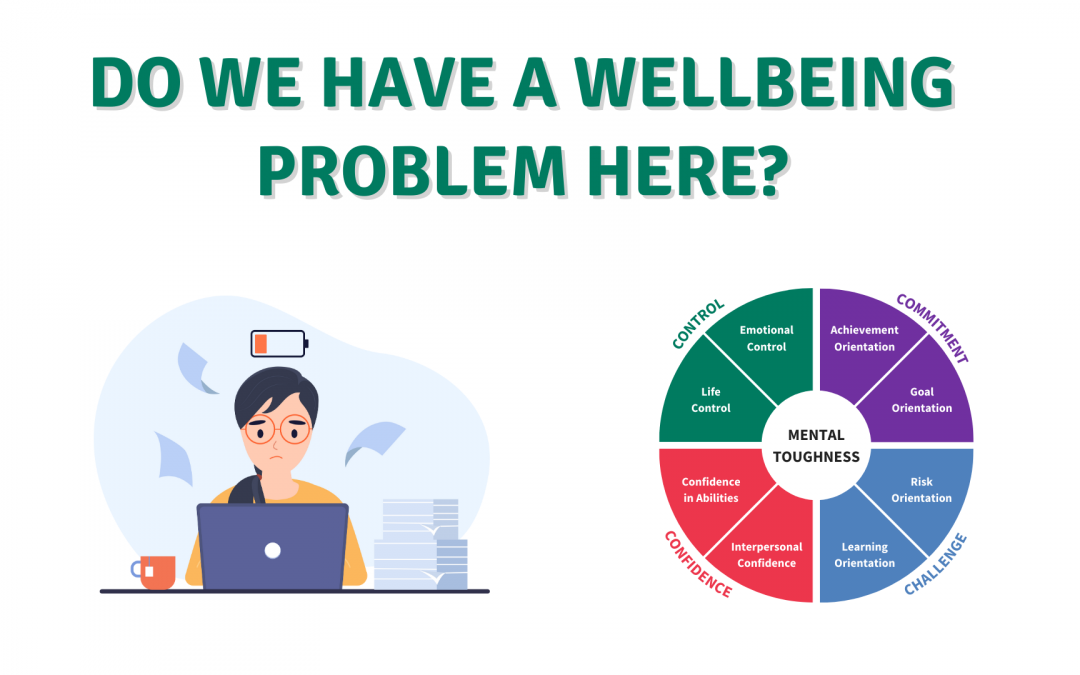“We’re high performers here. We always deliver. So why does anyone here think we have a wellbeing problem?”
Really!
This is a comment we got from a senior manager in a large multinational with whom we were working as we came to the end of a diagnostic phase on a wellbeing programme. In effect, he was denying there was a wellbeing issue, even though most staff acknowledged that there were many examples of stress, sleeplessness, work overload and burnout.
Use of the MTQPlus had shown that a significant proportion of the staff were more mentally sensitive. It was not a surprise that many felt stressed and anxious.
His challenge threatened to derail the programme. It was difficult for others to call out a senior manager. The session went silent. He was comfortable with the way things were.
Gradually it was pointed out that, the culture was indeed dynamic and high-performance, recognised as such by clients and staff. The nature of culture is that everyone within that culture can be swept up by it and will do everything they can to keep up.
They will appear to be going with the flow, but they are also likely “to be running on empty” and on the verge of burnout, etc.
The senior manager was not convinced – more mentally tough than most, he was focused on output and not on how that was being achieved. He only saw things from his standpoint.
Sadly, this is not an isolated instance.
How often do you hear one person say to another (usually more junior) “Well … if I can do it why can’t you?”. There is a good reason they cannot – they are not you, but they can still do a good job if they are not demotivated by statements like this.
This illustrates the importance of self-awareness about your mental toughness and its impact on others and the value of awareness of how others are responding mentally to you and the environment. The mentally tough might have some advantages but they can still fail because they lack this self-awareness and do what they should not.
Of course, one reason AQR is thriving, and the mental toughness concept is being embraced more widely is that more leaders are recognising the issues and seeking ways of dealing with them. Which do not always work.
A recent study on 143 UK firms conducted by Oxford University researchers* found most failed and some even did more harm than good.
The positive is that there is learning in that and usefully we collaborate with many clients who put thought into what they are doing and get it more right than wrong.
What we have learned is that there are 4Cs that are important in offering wellbeing and performance programmes.
Customization – the research shows that when this is missing, the intervention fails. The MTQ measures enable self-awareness in the individual about why, mentally, they thrive or struggle in their situations. It becomes personal to them. And not “one size fits all”.
Context – you cannot change only one aspect of a situation – the person. It is important to understand where the sources of stress and pressure in the organisation are and to purposefully set about reducing or eliminating them. This includes job design.
Care – helping the individual must be delivered so that the employee believes this is primarily for their benefit and that others genuinely care for their wellbeing. This is a leadership challenge.
Compassion – Again a leadership issue, this requires that the leaders understand how their people respond to different pressures and to different initiatives to alleviate these – and be prepared to adjust these as they learn which works best for which people.
Of course, a fifth C can often usefully be deployed here as a way of delivering this – Coaching.
For those who like tick boxes, if you can tick all four boxes, you stand a very good chance of success and improving wellbeing and that outcome – performance- for everyone’s benefit.
Finally, for those who see the kind of resistance we described at the start of this article and think you are outnumbered, persistence and perseverance (core themes in the mental toughness concept) can be your ally. As Margaret Mead noted: “Never underestimate the power of a small group of committed people to change the world. In fact, it is the only thing that ever has.”
AQR International works with a small number of clients, often pressured professional organisations, who seek to improve wellbeing and performance through deploying its expertise and its leading-edge materials and measures.
For information about this and about becoming a licensed user of the MTQ suite of measures contact: headoffice@aqrinternational.co.uk
The MTQPlus measure is available in fourteen languages, accessible to more than 2/3rds of the world’s population.
Completion of the AQR Licensed user training programme is recognised by EMCC and ICF for CPD purposes.


